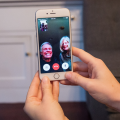Let the Wave Crash Over You: A Letter for My Brother

Chris & Ken in the early years (ages 7 and 2)
Dear Ken,
When I look back at all the memories we shared together, there are so many that stand out.
I tend to think of our childhood, which was not particularly a happy one for either of us—but my memories of you and me are consistently happy. I remember when we lived in different states and sent things back and forth to each other in the mail every week. We talked on the phone a lot then, too, but having something physical arrive in the mailbox was a fun thing that we each enjoyed.
I remember all the video games we played together. Well, I probably don’t remember all of them, since there were so many. But I remember going from console to console as we both grew up, sometimes competing against each other (you were always better at Sonic; I could usually beat you at Street Fighter) and sometimes cooperating.

Chris & Ken in 2001: Huntsville, Alabama
Years later, we continued our adventures, though not nearly often enough. On my first book tour we met in Michigan and then drove to Chicago and on to Wisconsin. On my second tour you flew to North Carolina and we spent two nights together before I went on to another city and you went back to work.
On my third book tour, less than a year ago, you offered to come to Seattle, but I didn’t respond in time and it never happened. This is something I will always regret.
***
In recent weeks, as I’ve spent many hours talking with your friends and colleagues, I’ve learned much more about you than I ever knew before. I learned that you ordered ridiculous drinks at Starbucks (“skinny vanilla latte with two pumps of peppermint” was your favorite—never would have guessed that!).
I learned that while you could appreciate an expensive bourbon or craft microbrew, your secret vice was Bud Light Lime.
More importantly, until recently I don’t think I understood how far you’d advanced in your career as a military investigator. After nearly ten years in the Army, you became a special agent for NCIS, and you set out to learn everything you could about doing the job well. By all accounts, from colleagues and supervisors alike, you were extremely thorough. You were passionate in pursuit of justice for victims. If you didn’t get something you needed through official channels, the government not being known for efficiency, you’d do everything you could to help someone unofficially.

Ken on a mechanical bull at WDS 2013
I also didn’t realize how strong your communication skills had become. Of the two of us I thought I was the better communicator, but that was obviously just my egocentric, older brother worldview. You led briefings for hundreds of people. One time you stood up at a serious government meeting and conducted your briefing in the form of a rap. Everyone looked back at you stoically at first, but they were all smiling by the time you finished. That was brave of you, Ken.
I was surprised to hear several of your co-workers say that you were the most thoughtful person they’d ever known.
Even as you gained the confidence to confront someone who was suspected of lying in an investigation, you were also highly respectful. You were nice to everyone you encountered, even people who were accused of serious crimes. You did everything you could to make people feel at ease, especially people who had been wronged, and you tried to make their lives better however you could.

Ken in Afghanistan in 2007
Your work partner, Rachel, with whom you spent 60 hours a week for the past two years, told me a story about going to an Indian restaurant. The two of you had been to this restaurant several times before, and the staff always welcomed you warmly and called you “Officer Ken!” She was friendly with the staff, but you went above and beyond and took a special interest in them. This was right after the Nepal earthquake, and on the way out you asked one of them how his family was doing. Rachel had no idea that this person was Nepalese, but somehow you knew—and according to her, this was typical.
You did things like that everywhere you went, and you touched more people than you probably knew.
In hearing these stories I’ve realized that I haven’t been as kind as you were, Ken. I’ve often been hostile or short with people, and I haven’t always been very understanding. I’ve made a promise to myself that I’ll adopt this highly positive quality of yours more often in the future.

Ken and his wife Nicole in Washington D.C.
One of my favorite stories came from your wife, Nicole. It was about your incredibly hyper-active (yet lovable) dog, Gizmo. Nicole had originally adopted Gizmo while you were away on a training, and at first you weren’t excited about having a dog in the household. Over time, though, you came to love him at least as much as she did.
A few weeks before everything changed, Nicole came home from work and saw that Gizmo had been sick. He was nine-years-old and had never had a real illness, so she knew something was wrong. She found an after-hours vet and texted you to say she was taking him in. “Wait for me,” you told her. “I’ll be home in 20 minutes.”

Ken and Gizmo the Rambunctious Yorkshire Terrier
You came home in your government-issued vehicle, affectionately known as the G-car, which was equipped with a turbo-charged engine and flashing lights. There were strict rules against running personal errands or transporting friends and family members in the vehicle, but you had a plan. You put Gizmo in the G-car and told Nicole to follow behind in another car while you sped to the vet, ignoring multiple traffic signals along the way. Gizmo got some antibiotics and you transported him home (no flashing lights this time) for his recovery.
“I can’t believe you put him in the G-car!” your work buddies said when you mentioned it the next day.
“But the rules don’t say you can’t take your dog!” you told them.
I laughed so hard when I heard this story. The next day I saw an unmarked cop car turn on its flashing lights and proceed up the highway toward downtown Washington, DC, and I immediately thought, “That must be another undercover agent taking his dog to the vet.” I think I’ll always remember this story whenever I see flashing lights, and it will always make me smile.

Taking Gizmo to meet his elders
***
In addition to the stories of kindness and the funny stories, as I talked with your co-workers I also learned of some real struggles you’d been going through.
You were due for an automatic promotion in pay grade, thanks to your earlier investigative work with the Army. This promotion had been promised to you before you began your new job, where you accepted a pay cut in exchange for a more interesting role. When the time came to receive it, however, no one seemed to know anything about the process.
You did everything you could to appeal the denied request, but had no luck and were greatly discouraged. After being turned down by headquarters, your partner Rachel found you in your office, looking depressed with your feet up on your desk.
“I feel like I’ve wasted my whole life,” you told her, a statement that seemed overly-dramatic at the time.
“Snap out of it, Ken,” she replied. “Sure, it sucks, but you can recover.”
Later, you agreed that she was right. The news was disappointing but hardly the end of the world. You bounced back, setting up interviews as you looked around for another job that could make better use of the skills you’d honed in three years of doing investigations full-time. You made plans to attend a drill for the Army Reserve, where you’d continued to serve after taking on the NCIS job, and you booked a flight for a trip to Portland, just three weeks away.
But something was still clearly wrong. “I’m a broken man,” you said to another friend at some point during a vulnerable moment.
“What does that mean?” they asked.
“I just feel so broken,” you said. “I don’t know what’s wrong with me.”
The last time we talked, you wrote to me about the crowdfunding campaign for Shenmue III, a video game we were both excited about. “I’m gonna kickstart the shit out of this campaign!” you said. “Haha,” I replied. “That’s awesome.”
Those were the final words we shared. It’s been more than six weeks since you died, and I still can’t bear to go back and look at all our other emails and messages.
***
On the evening of June 20, you went to dinner with Nicole and then came home to watch Netflix on the couch. Around midnight you said you were going to bed, and she said she’d join you shortly. But you never went to bed, and less than fifteen minutes later, you had died.
When I heard the news the next morning, it was the saddest thing I’d ever heard in my life.
For days and then weeks, everyone who loved you was in complete shock. “This isn’t possible,” we all said. “It must be some mistake. Somehow it must be an accident.”
But the circumstances of your death were such that there was little room for any other interpretation. You were going through something that none of us understood, and you chose to end the pain the only way you saw how, with finality and conclusiveness.

Ken and Nicole at Luray Caverns in Virginia
A few weeks later, Jolie and I traveled to Washington for your funeral. We watched as three young Marines conducted a flag-folding ceremony above the coffin, presenting the finished product “on behalf of the President of the United States” to your wife Nicole, who was now a 32-year-old widow.
Together with Max, your brother-in-law, and several of your NCIS colleagues, I served as your pallbearer when we went from the church to the cemetery. Our duties took less than 30 seconds, but they felt like the saddest time vortex in history. Max and I looked at each other afterwards and I asked, “How was that for you?”
“Heavy,” he said, and I knew exactly what he meant.
In the classic stages of grief, denial comes first (“this can’t be possible”) followed by anger. I can understand why some people feel angry toward those who make this irreversible choice. It’s a natural response and not an unfair one.
For me, though, I already know that this stage will be directed in a very different manner. I can’t be angry with you, Ken. I’m just so sorry you were going through this, and that you saw no way out. I just wish I could have done something. I will wish this every day for as long as I live.
***

Cactus Ken in Arizona
In the aftermath of this unimaginable disaster, I’ve struggled a great deal. Around the same time I learned some other sad news, completely unrelated to you, and the combination of both burdens became almost unbearable. And then, of course, I felt guilty for feeling bad about anything other than you. Why should I feel sorry for myself when you’re the one who’s gone?
The overwhelming sense of sadness wouldn’t leave, and for the first time in twenty years of adulthood, I went to the doctor and said I’d be willing to try taking an antidepressant for a while. She prescribed something for me and I began taking a low dose. It had no noticeable effect and I thought I’d need to increase the amount at some point. But mostly I felt ambivalent about the whole thing, so I stopped taking it after two weeks. I’d never relied on medication to make me happy before, and it seems that you didn’t either.
Then I heard something else you’d said to your work partner, who always said that she was the one with issues and that if anything crazy ever happened, it would happen to her. Just a few months earlier, you and her were talking about a struggle she was going through. You told her what you did during your own struggles. “When I feel the wave coming,” you said, “I just let it crash over me. I don’t try to mask it or run from the pain.”
Let the wave crash over you. Don’t try to run from the pain.
In the midst of this inconsolable sadness, I’ve thought about that many times.
After the funeral we went back to your house. Unfortunately there was no Bud Light Lime in the fridge, but we had some other beers and told stories about you. Someone suggested we go outside and “pour one out” on the ground for you. Nicole and I looked at each other and had the same thought: “Ken wouldn’t want us to waste the beer!”
We didn’t waste any beer, but the reality is that we’d all do anything in the world to bring you back.
In the weeks since the funeral, everyone who knew you well has been walking around in a daze. None of us have any real answers, though when I consider the whole story I understand that you were facing something you couldn’t defeat on your own, and on the night you died you made what seems to have been a very impulsive decision. This was a bad decision, of course—the very worst that anyone can make—but I can accept that at the time you felt there was no other way.
Then, when I heard the story about the wave, I realized that you must have encountered one you couldn’t handle on your own. I’m sorry I couldn’t be there to carry that wave for you, Ken.
People say things like “There’s nothing you could have done,” but there’s no way to know if that’s true. I wish I’d been there for you in your darkest hour, and I only wish I could do something more now.
Instead, all I can do is think: how can I be kind, like you? How can I live out your memory now that you are… gone?
Dear Ken, I loved you so much and I always, always will. I assure you I will never, ever forget you.
I will think of you every day.
Your brother,
Chris
###
Note to readers: There are no comments on this post, but if you’ve made it this far, thanks for reading. More than anything I wish this story had a different ending. Since we can’t change what happened, I wanted to share a bit more about Ken for those who were interested.
If you’re struggling and ever think of ending your life, please talk to someone. For those in the U.S., you can call 800-273-Talk or text “start” to 741-741 for a confidential session. There are also numbers and contacts for people in other countries.







